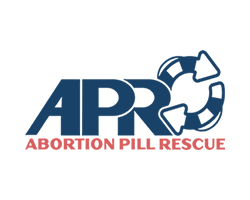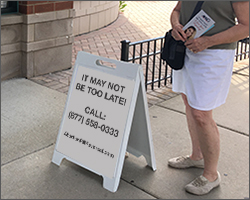When most people think of abortion, they generally think of surgical abortion. However, more and more abortions are being carried out not with surgery but with medicines like RU-486. This type of abortion was depicted in graphic detail in the 2019 movie Unplanned about former Planned Parenthood manager Abby Johnson.
The approval of medication abortion by the FDA in the year 2000 presented sidewalk counselors with a whole new set of challenges. The resources below will educate you on this important topic and prepare you to reach out to women seeking medication abortions.
- What is medication abortion?
- How common is medication abortion?
- What are the complications of medication abortion?
- Challenges for pro-life outreach
- Abortion pill reversal
- Resources for sidewalk counseling
What is medication abortion?

Progesterone maintains the uterine lining, in which the embryo implants and upon which it depends for sustenance. When progesterone is blocked, the uterine lining breaks down, killing the embryo.
Mifepristone is ingested during a woman’s visit to the abortion facility. Before she leaves, she will be provided with a second medication, misoprostol (known commercially as Cytotec), and instructed to take it 24-48 hours later.
Misoprostol causes the uterus to contract and expel the uterine lining, along with the now deceased embryo.
The physical experience of medication abortion can range from being to a heavy menstrual period to cramping and bleeding so severe as to require hospitalization.
How common is medication abortion?
The percentage of abortions performed by medication has risen steadily, and is now nearly 40% of all abortions in the U.S. annually. This trend is likely to increase over time. It is speculated that many women consider medication abortion less intimidating than surgical abortion.
The low cost and simplicity of this method also makes it attractive to abortion providers. Many have opened pill-only abortion facilities, which increased by 7% in 2018 alone.
Some providers even offer tele-medicine abortion, in which the woman never sees the abortionist in person, but only via an online video link. Tele-medicine abortions are banned in several states.
What are the complications of medication abortion?

The abortion industry claims serious complications from medication abortion are rare, but we have serious reason to doubt these claims.
Former Planned Parenthood manager Sue Thayer, who is now a pro-life advocate working for 40 Days for Life, has reported that Planned Parenthood instructs medication abortion patients who experience complications to go to the emergency room and say they’re having a miscarriage.
If women are following Planned Parenthood’s directives to lie about their medication abortions, the actual rate of complications may be much greater than reported. This practice puts patients in danger and robs the public and the medical research community of vital data.
Challenges for pro-life outreach
The advent of the abortion pill has made pro-life outreach more difficult in several ways.
Before medication abortion, it was relatively easy for sidewalk counselors to identify which patients were entering a facility for abortion rather than other medical services. Surgical abortion clients are typically instructed to wear loose clothing, need to be accompanied by someone who can drive them home, and generally had the affect of a person approaching surgery rather than someone planning to take a couple of pills.
But now that medication abortion is so common, any woman entering a facility where abortions are done might be there one, regardless of how she’s dressed or whether she’s alone. A woman arriving on her own in everyday clothes with a smile on her face is harder to identify as an abortion client.
An additional challenge is presented after her appointment. Before the advent of medication abortion, the only help that could be offered a woman as she left the abortion facility was information about post-abortion healing.
But now, a woman who has taken only the first abortion pill may still be able to change her mind and save her baby.
Abortion pill reversal

In recent years, pro-life doctors have developed a protocol for “abortion pill reversal.” The group Abortion Pill Rescue has been at the forefront of promoting this life-saving resource.
If the woman has only taken the first abortion pill, the progesterone-blocking mifepristone, the timely administration of progesterone will sometimes halt the effect of mifepristone, preserving the uterine lining and saving her baby’s life.
Progesterone can be administered orally, vaginally, or by injection, and this treatment is typically continued through the first trimester, while the mifepristone wears off and the body resumes normal production of progesterone.
This protocol is still being perfected and has not yet been the subject of clinical trials. But there have been many documented cases of women following the abortion pill reversal protocol and saving their babies’ lives.
The abortion industry is desperately trying to discredit this emerging science, calling it unproven, but results so far have been promising. Moreover, there is no risk involved in the administration of progesterone; if it could save a life, it’s worth trying.
Resources for sidewalk counseling

First, be sure you know your stuff. Thoroughly review the information presented here about how medication abortion works, and how the procedure can be reversed. See the website AbortionPillReversal.com for additional information.
Next, get a sign you can use when sidewalk counseling to inform women about abortion pill reversal. There are two options for this, depending on the lay of the land at the abortion facility:
- If there is place on the public right-of-way where you can stake a sign, download this sign design [PDF] for printing on a sturdy material like coroplast at a sign printer like FedEx Office or Office Depot.
- If there is not an appropriate place for staking a sign in the ground, buy a sandwich board sign frame like this one and download this sign design [PDF] for printing and laminating at a sign printer.
Finally, stock up on literature from the group Abortion Pill Rescue here, including their phone number, (877) 558-0333.
